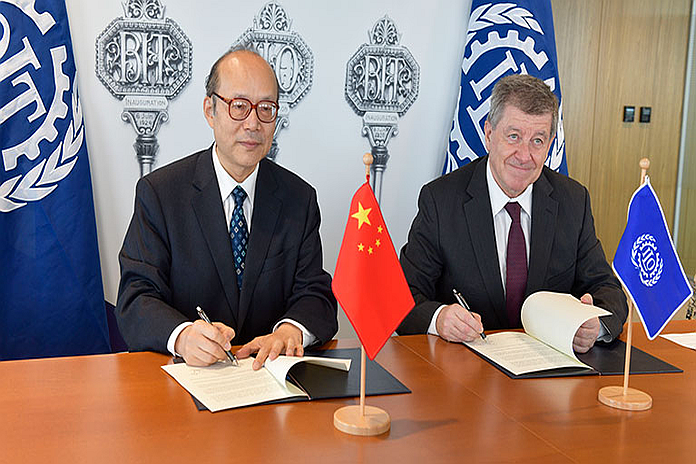GENEVA, Switzerland, (ILO News) – On 12 August 2022, the government of China deposited the instruments of ratification of the Forced Labour Convention, 1930 (No. 29) and the Abolition of Forced Labour Convention, 1957 (No. 105), bringing the number of ILO Fundamental Conventions ratified by China to seven and the total number of China’s ratified ILO Conventions to 28. With these ratifications, China, which is a founding Member State of the ILO, reinforces its commitment to respect, promote and realize the ILO Fundamental Principles and Rights at Work.
Convention No. 29 prohibits the use of forced labour in all its forms and requires State parties to make forced labour practices punishable as a penal offence. This instrument was supplemented by Convention No. 105, which calls for the immediate abolition of compulsory labour as a means of political coercion or education or punishment for the expression of political views, mobilizing and using labour forces for purposes of economic development, labour discipline, punishment for participation in strikes; and racial, social, national or religious discrimination.
According to the latest global estimates there are still about 25 million people globally who are forced to work under threat or coercion. Moreover, many workers, who were particularly hard hit by the economic consequences of the COVID-19 pandemic, have become more vulnerable to being trapped in forced labour.
In depositing the instrument of ratification, H.E. Chen Xu, ambassador extraordinary and plenipotentiary and permanent representative of the People’s Republic of China to the United Nations Office at Geneva and other International Organizations in Switzerland, stated:
“It is my great honor to deposit the instruments of ratification of Convention No. 29 and Convention No. 105 to the International Labour Office on behalf of the government of China. Based on the people-centered philosophy of development, China attaches high importance to protect workers’ rights and interests. We adopt a positive, earnest and responsible attitude toward ratifying international labour Conventions. Those ratified earlier have all been effectively implemented. This April, the 34th session of the Standing Committee of the 13th National People’s Congress decided to ratify two ILO Conventions, namely the Forced Labour Convention, 1930 and the Abolition of Forced Labour Convention, 1957. China consistently opposes forced labour. By completing the ratification of the two Conventions of its own accord, the government of China has once again made clear its resolute position on fighting against forced labour.”
Receiving the instruments of ratification of the two ILO Conventions, Guy Ryder, director-general of the ILO, said:
“We welcome the ratification by China of these two ILO Fundamental Conventions on forced labour which aim to suppress the use of forced or compulsory labour in all its forms, including as a means of racial, social, national or religious discrimination. This is a crucial opportunity to promote renewed momentum and further efforts by the government and the social partners in China to combat forced labour and support human-centered development and decent work in the second largest economy in the world. These two ratifications also pave the way towards the realization of the Sustainable Development Goal 8, Target 7 , which calls on states to take immediate and effective measures to eradicate forced labour and end modern slavery and human trafficking.”
Notwithstanding the absence of its ratification of ILO Conventions on forced or compulsory labour, over the years China has implemented a number of measures including the abolition of re-education through labour in 2013; the abolition of the custody and education system for sex workers in 2019; the introduction of the Labour Contract Law in 2007 that aims to formalize employment relationships and contains specific provisions prohibiting forced labour; the recognition in law of the right of labourers to equal employment and to choose jobs on their own initiative in the 2007 Employment Promotion Law; the incorporation of the crime of forced labour into the Criminal Law; and the adoption of a national action plan to combat trafficking in persons, which is overseen by the ministry of public security.
At the international level, China has endorsed the Call to Action to End Forced Labour, Modern Slavery and Human Trafficking , launched by world leaders during the UN General Assembly in 2017, which includes a commitment to endeavour to ratify and ensure the effective implementation of relevant international conventions, protocols, and frameworks. Furthermore, the ILO and China have a long-standing partnership for the promotion of social justice and decent work that has intensified in recent years on South-South and triangular cooperation (SSTC).





